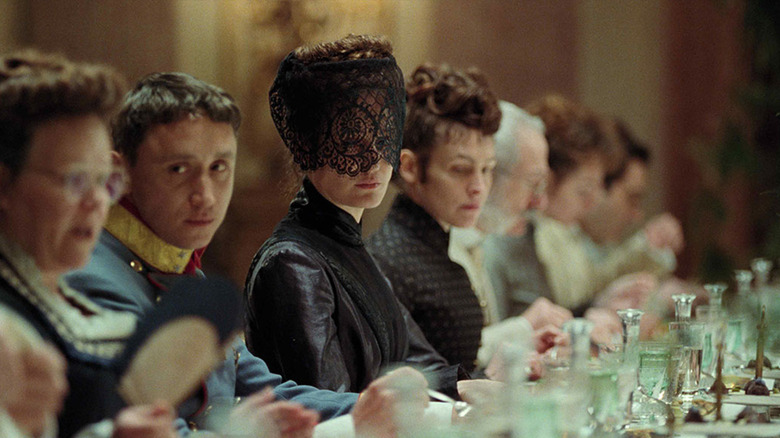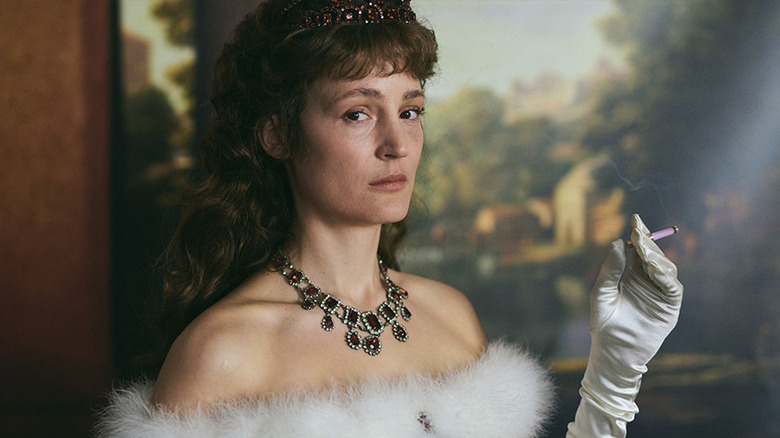Corsage Review: An Intimate Portrait Of Empress Elizabeth [TIFF]
The aristocracy is a fascinating subject for film to explore; the world of royal families and monarchies seems so distant, so foreign, from our everyday, mundane existences, that it's only natural to be curious. Perhaps this is why there's such a long tradition of biopics focusing on royalty — films that pull back the curtain to offer a tantalizing look at the inner lives of these endlessly fascinating public figures.
Marie Kreutzer's 2022 feature "Corsage" is one such film, exploring the later years of Empress Elizabeth of Austria. The Empress was famous in her lifetime for her figure and good looks, and she was reputed to have been obsessed with maintaining her appearance throughout her adult life. Kreutzer uses this public perception of the royal figure and twists it ever so slightly, creating a nuanced portrait of a complicated woman — one who may be part of the ruling elite, but whose problems can often be reduced down to the same pressures and pains virtually every woman experiences.
Elizabeth is played with grace and fervor by Vicky Krieps. The role is a demanding one, but the actor fully embraces it; Elizabeth is one of those protagonists who aren't inherently likable, yet Krieps finds ways to endear her Empress to the viewer. Yes, she's incredibly vain and selfish, playing with the men and women who serve her as if they are her personal playthings, showing very little regard for their happiness, safety, or general well-being. At the same time, she's isolated and misunderstood. There's a rebellious spirit burning underneath the facade of decorum force upon her, occasionally flashing through the cracks. There's a sense that this person hidden just out of view — the fun-loving, caring, free-spirited woman — is who Elizabeth truly is. But because of the formalities and etiquette painfully shaping her every move, she instead appears as a stiff, cold, and occasionally heartless sovereign.
A life of beauty and pain
The cinematography in "Corsage" is sumptuous. There's a lush vibrancy in each carefully composed shot that compliments the story and elevates the action. Kreutzer skillfully directs the film, crafting interesting compositions that hint at Elizabeth's hidden life while emphasizing both the rigidity of her routine and the isolation. In the quiet moments — often darkly lit and bathed in candlelight — we see Elizabeth's intimate, sensual side. At a hospital, Elizabeth in her deep violet attire — from head to toe — marks a startling contrast to the impersonal, astringent white surroundings. She doesn't belong there — how could she? — but something pulls her to the "lunatic asylum," perhaps hinting at a clawing depression, deep in her psyche.
I don't often speak of the costumes in my reviews (I probably should), but I would be remiss not to address just how striking and stately Krieps looks here. Outfits like her all-black gown with an impossibly small wasp-like waist and a full veil of lace covering her face — it's beautiful and absolutely surreal at the same time. Her dresses never stray too far from the realm of believability, and yet, she cuts such a distinctive, majestic silhouette that she almost feels out of place in this world — like a fairy queen from a fantasy setting. Given the film's thematic leanings, this approach to Elizabeth's costuming is ideal: It honors the real-life Empress' legacy of beauty while also contributing to the themes Kreutzer wants to explore.
Like other royalty biopics, "Corsage" suffers from the excess that can turn off some audiences — particularly those already critical of the aristocracy, who are unlikely to sympathize with the extremely privileged lifestyle on display. It may be a tragic premise, but not all viewers will be able to muster up the necessary emotional investment to care about Elizabeth's boredom.
"Corsage" is an experience. It's a thoroughly well-crafted film that exudes exquisite taste, all while contemplating the female perspective. Empress Elizabeth, like the suburban housewives of post-war America, may seem to have it all, but she feels useless — her fading beauty and evaporating youth are the only attributes the world seems interested in. It's a fascinating treatise on femininity and identity — with implications and lessons that apply to the 21st century, as well as the 19th.
/Film Rating: 8 out of 10

